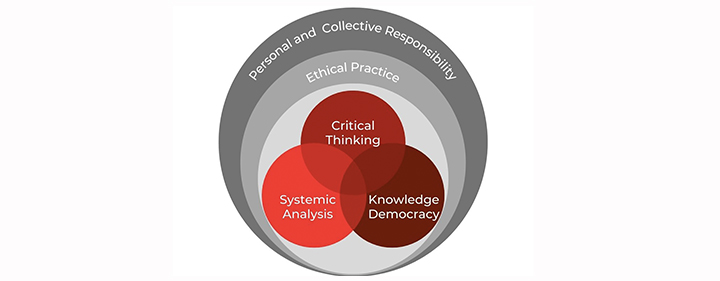
1. Critical Thinking
- Makes connections between academic studies and experiential learning activities.1
- Asks questions thoroughly and continuously challenges assumptions.
- Practices creative and cooperative problem solving.
- Has an awareness of one’s own thought processes (metacognition) and how they change.
- Identifies and grows from challenges and failures, using newly formed knowledge to inform future actions.
2. Knowledge Democracy
-
Recognizes multiple sources and types of knowledge.
- Understands that lived experience yields insights.
- Employs third space2 thinking/ border theory3 over simplistic binaries.
-
Considers the politics of knowledge production.
- Develops awareness of the historical production, disciplining4, and/or destruction5 of knowledge systems6.
- Analyzes the connection between power/ authority and the creation of knowledge.
- Identifies political stakes of attacks on truth, facts, and science.
- Understands the uses of knowledge in the service of action.
3. Systemic Analysis
- Investigates and understands cultural, historical, social, political, economic, and institutional factors that shape contemporary communities and the perspectives and identities of community members.
- Understands roots of inequity and injustice (including, for example, oppression based on the intersections between race, gender, sex, class, and ability) and develops knowledge, skills, values and motivation needed to bring about positive social and political change.
- Learns about Providence, Rhode Island, Brown University, and their historic and current relationship.7
- Understands how change work exists within (and across) non-profit, governmental, grassroots, private, and higher education institutions.

4. Ethical Practice
- Understands how to identify the assets and needs of communities, in conversation with community members.
- Understands dynamics of community mistrust arising from historical and institutional practices and policies.
- Works actively to redress power imbalances in social interactions and decision-making.
-
Utilizes institutional and community-identified guidelines in community-engaged teaching, learning, and research to avoid extractive, exploitative, and/or damage-centered engagement.
- Considers dynamics of access, ownership, dissemination, accountability, and mutual gain in engagement.
- Prioritizes sustainability and relationships as well as outcomes and deliverables.
- Practices radical empathy.8
5. Personal and Collective Responsibility
- Examines intersections between identity and positionality alongside power, privilege and oppression on individual and communal levels.
-
Practices collaboration and coalition building through anti-racist and anti-oppression frameworks.
- Effectively communicates, translates, and facilitates transparent and honest dialogue.
- Understands the importance of reliability and accountability to communities.
- Acknowledges harm, moves towards transformative justice.9
- Recognizes the interrelationship between self care and community care, and creates healthy boundaries and sustainable work styles.
-
Recognizes that justice work, in all aspects of one’s life, is an ongoing process that requires humility and courage to persist in spite of ambiguity and obstacles.
- Creates incremental impacts while working toward systemic change.
References
1. Connecting in-classroom learning with learning beyond the classroom. Experiential learning activities can include, for example, internships, practicums, laboratory work, study abroad/away, community-based research, fieldwork, and studio performance. See Kolb, David. Experiential Learning: Experience As The Source Of Learning And Development. Prentice Hall, 1984. Cantor, Jeffrey A. Experiential Learning in Higher Education: Linking Classroom and Community. ASHE-ERIC Higher Education Report No. 7. ERIC Clearinghouse on Higher Education, 1995. Bass, Randy. "Disrupting ourselves: The problem of learning in higher education." EDUCAUSE review 47.2 (2012): n2. For resources on experiential learning at Brown see, Learning Beyond the Classroom.
2. Postcolonial theorist, Homi Bhabha popularized the notion of the third space as an ambiguous site that is the byproduct of two seemingly opposite forces meeting. “And by exploring this Third Space, we may elude the politics of polarity and emerge as the others of our selves” (56). Bhabha, Homi K. The Location of Culture. Routledge, 2004. Neither here nor there, then nor now, the third space focuses attention away from dichotomies between origins and copies. “But for me the importance of hybridity is not to be able to trace two original moments from which the third emerges, rather hybridity to me is the ‘third space’ which enables other positions to emerge. This third space displaces the histories that constitute it, and sets up new structures of authority, new political initiatives, which are inadequately understood through received wisdom. “ (211) “...because the notion of hybridity… is about the fact that in any particular political struggle, new sites are always being opened up, and if you keep referring those new sites to old principles, then you are not actually able to participate in them fully and productively and creatively.” (216) Rutherford, Jonathan. 1990. "The Third Space. Interview with Homi Bhabha." In Identity: Community, Culture, Difference. London: Lawrence & Wishart, 1990; 207-221.
3. See Anzaldúa, Gloria E. Borderlands/La Frontera: The New Mestiza. Spinsters/Aunt Lute Books, 1987. Mary Pat Brady writes, “ In keeping with the critical theoretical work of other feminists of color, Anzaldúa questioned the production and maintenance of binaries, their exclusionary force, and the maxims that suggest that living with contradiction necessarily entails psychosis. Instead, she mobilized a second spatial metaphor—that of the borderlands or la frontera—to insist that one can embrace multiple contradictions and refuse the impossible effort to synthesize them fully, thus turning apparent oppositions into sources of insight and personal strength.” Brady, Mary Pat. "6 Border." In Keywords for American Cultural Studies, Second Edition. New York University Press, 2014; 33-47. See also Lugones, María. "On borderlands/La frontera: An interpretive essay." Hypatia 7, no. 4 (1992): 31-37. Mignolo, Walter D. Local Histories/Global Designs. Coloniality, Subaltern Knowledges and Border Thinking, Princeton University Press, 2000.
4. Foucault, Michel. Discipline and punish: The birth of the prison. Vintage, 2012.
5. de Sousa Santos, Boaventura. Epistemologies of the South: Justice Against Epistemicide. Routledge, 2015.
6. See UNESCO’s Local and Indigenous Knowledge Systems (LINKS).
7. See Swearer Center. “Resources on Providence/RI Context for Engaged Scholarship.”
8. Givens defines six features in the practice of radical empathy, “1. A willingness to be vulnerable. 2. Becoming grounded in who you are. 3. Opening yourself to the experiences of others. 4. Practicing empathy. 5. Taking action. 6. Creating change and building trust.” Givens, Terri. Radical empathy: Finding a path to bridging racial divides. Policy Press, 2021.
9. “Transformative Justice uses the power unleashed by the harm of a crime to let those most affected find truly creative, healing solutions.” Morris, Ruth. Stories of transformative justice. Canadian Scholars’ Press, 2000, pg. 3. On the contemporary possibilities, limits, and contexts of transformative justice see, Piepzna-Samarasinha, Leah Lakshmi and Ejeris Dixon, eds. Beyond survival: Strategies and stories from the transformative justice movement. AK Press, 2020.

